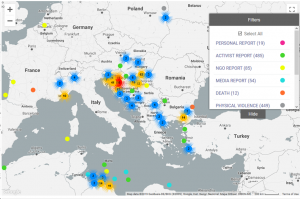published by www.pushbackmap.org
Zagreb, June 18th 2019
A Tool to Collectively Fight the Repressive Border & Control Regime
Currently we are witnessing an increase in institutional violence across Europe. At the EU’s borders expulsions, direct deportations, readmissions and other forms of forced returns across borders are happening on a daily basis. These violent practices are called push-backs.
They are a systematic institutionalised technique used to suppress movement across borders. With our newly developed online tool The Push-back Map, www.pushbackmap.org, we aim to map, document, visualise and denounce these practices.

“We were walking in the forest before we reached the bus station […] I saw a police patrol, they were searching the area and [we] turned around from the police and went down into the forest. […] They never gave us the chance to ask for [asylum]… the officers started to beat [me] and kick with their shoes.” (Account of a push back from Croatia to Bosnia by an Iraqi minor, January 21, 2019)
The Push-back Map is a collective space of resistance against the EU border control regime. It aims to visualise the struggles of crossing, challenging and fighting state sovereignty.
